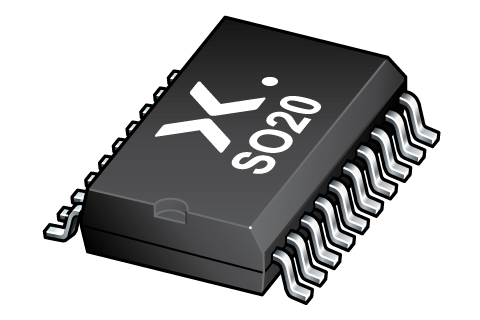可订购部件
| 型号 | 可订购的器件编号 | 订购代码(12NC) | 封装 | 从经销商处购买 |
|---|---|---|---|---|
| 74HCT374D | 74HCT374D,653 | 933713490653 | SOT163-1 | 订单产品 |
试用我们种类齐全的评估板,体验我们的设备及其性能。深入了解我们的产品如何助您提高效率、稳健性和可靠性,让您的应用大受裨益。您可以在这里找到聚焦在应用、封装和不同的 Nexperia 产品的评估板。

Register once, drag and drop ECAD models into your CAD tool and speed up your design.
Click here for more informationOctal D-type flip-flop; positive edge-trigger; 3-state
The 74HC374; 74HCT374 is an octal positive-edge triggered D-type flip-flop with 3-state outputs. The device features a clock (CP) and output enable (OE) inputs. The flip-flops will store the state of their individual D-inputs that meet the set-up and hold time requirements on the LOW-to-HIGH clock (CP) transition. A HIGH on OE causes the outputs to assume a high-impedance OFF-state. Operation of the OE input does not affect the state of the flip-flops. Inputs also include clamp diodes, this enables the use of current limiting resistors to interface inputs to voltages in excess of VCC.
Wide supply voltage range from 2.0 V to 6.0 V
CMOS low power dissipation
High noise immunity
Input levels:
For 74HC374: CMOS level
For 74HCT374: TTL level
Octal bus interface
Non-inverting 3-state outputs
8-bit positive, edge-triggered register
Common 3-state output enable input
Independent register and 3-state buffer operation
Complies with JEDEC standards
JESD8C (2.7 V to 3.6 V)
JESD7A (2.0 V to 6.0 V)
Latch-up performance exceeds 100 mA per JESD 78 Class II Level B
ESD protection:
HBM: ANSI/ESDA/JEDEC JS-001 class 2 exceeds 2000 V
CDM: ANSI/ESDA/JEDEC JS-002 class C3 exceeds 1000 V
Specified from -40 °C to +85 °C and -40 °C to +125 °C
| 型号 | VCC (V) | Logic switching levels | Output drive capability (mA) | tpd (ns) | fmax (MHz) | Power dissipation considerations | Tamb (°C) | Rth(j-a) (K/W) | Ψth(j-top) (K/W) | Rth(j-c) (K/W) | Package name |
|---|---|---|---|---|---|---|---|---|---|---|---|
| 74HCT374D | 4.5 - 5.5 | TTL | ± 6 | 13 | 48 | low | -40~125 | 85 | 27.2 | 61 | SO20 |
| Model Name | 描述 |
|---|---|
|
|
| 型号 | 可订购的器件编号,(订购码(12NC)) | 状态 | 标示 | 封装 | 外形图 | 回流焊/波峰焊 | 包装 |
|---|---|---|---|---|---|---|---|
| 74HCT374D | 74HCT374D,653 (933713490653) |
Active | 74HCT374D |

SO20 (SOT163-1) |
SOT163-1 |
WAVE_BG-BD-1
|
暂无信息 |
| 文件名称 | 标题 | 类型 | 日期 |
|---|---|---|---|
| 74HC_HCT374 | Octal D-type flip-flop; positive edge-trigger; 3-state | Data sheet | 2024-08-05 |
| AN11044 | Pin FMEA 74HC/74HCT family | Application note | 2019-01-09 |
| AN90063 | Questions about package outline drawings | Application note | 2025-03-12 |
| SOT163-1 | 3D model for products with SOT163-1 package | Design support | 2020-01-22 |
| Nexperia_package_poster | Nexperia package poster | Leaflet | 2020-05-15 |
| SOT163-1 | plastic, small outline package; 20 leads; 1.27 mm pitch; 12.8 mm x 7.5 mm x 2.65 mm body | Package information | 2024-11-15 |
| 74HCT374D_Nexperia_Product_Reliability | 74HCT374D Nexperia Product Reliability | Quality document | 2025-03-20 |
| HCT_USER_GUIDE | HC/T User Guide | User manual | 1997-10-31 |
| WAVE_BG-BD-1 | Wave soldering profile | Wave soldering | 2021-09-08 |
The Nexperia Longevity Program is aimed to provide our customers information from time to time about the expected time that our products can be ordered. The NLP is reviewed and updated regularly by our Executive Management Team. View our longevity program here.
| 文件名称 | 标题 | 类型 | 日期 |
|---|---|---|---|
| SOT163-1 | 3D model for products with SOT163-1 package | Design support | 2020-01-22 |
| Model Name | 描述 |
|---|---|
|
|
| 型号 | Orderable part number | Ordering code (12NC) | 状态 | 包装 | Packing Quantity | 在线购买 |
|---|---|---|---|---|---|---|
| 74HCT374D | 74HCT374D,653 | 933713490653 | Active | 暂无信息 | 2,000 |
|
作为 Nexperia 的客户,您可以通过我们的销售机构订购样品。
如果您没有 Nexperia 的直接账户,我们的全球和地区分销商网络可为您提供 Nexperia 样品支持。查看官方经销商列表。
The interactive datasheets are based on the Nexperia MOSFET precision electrothermal models. With our interactive datasheets you can simply specify your own conditions interactively. Start by changing the values of the conditions. You can do this by using the sliders in the condition fields. By dragging the sliders you will see how the MOSFET will perform at the new conditions set.